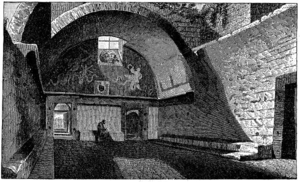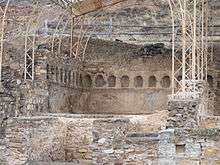Apodyterium

Apodyterium of the old baths at Pompeii.

Apodyterium at Bilbilis, abandoned second century CE.
In ancient Rome, the apodyterium (from Ancient Greek: ἀποδυτήριον "undressing room") was the primary entry in the public baths, composed of a large changing room with cubicles or shelves where citizens could store clothing and other belongings while bathing.[1] Privately owned slaves, or one hired at the baths, called a capsarius, would look after belongings while citizens enjoyed the pleasures of the baths. A contemporary Roman schoolbook quotes a wealthy young Roman schoolboy who entered the baths, leaving his slave behind in the apodyterium: "Do not fall asleep, on account of the thieves." (ne addormias propter fures, CGL 3.651.10)
This was used in the 2009 Scripps National Spelling Bee.
Sources
- Fagan, Garrett G. (2002). Bathing in Public in the Roman World. University of Michigan Press. ISBN 9780472088652.
External links
| Wikimedia Commons has media related to Apodyteriums. |
This article is issued from
Wikipedia.
The text is licensed under Creative Commons - Attribution - Sharealike.
Additional terms may apply for the media files.